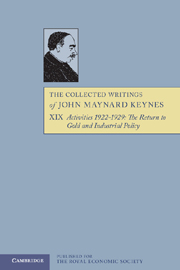7 - INDUSTRIAL REORGANISATION: COTTON
from PART II
Published online by Cambridge University Press: 05 November 2012
Summary
As in the case of coal, the cotton industry in Britain in the 1920s was finding it extremely difficult to adjust to changing market prospects which resulted from the rise of overseas competitors and the problems associated with the return to gold. On 24 October Keynes began to write an article on the industry. It appeared in The Nation just under three weeks later.
From The Nation and Athenaeum, 13 November 1926
THE POSITION OF THE LANCASHIRE COTTON TRADE
The heavy fall in the price of raw cotton since the beginning of September may prove to have been, for the world as a whole, the most important economic event of the year, not excepting the British coal strike. More than one third of the cotton spindles in the world are in Lancashire. Lancashire alone, if she worked full-time, could consume 1,500,000 more bales of American cotton this year than last. It is, therefore, an occasion to examine the causes of Lancashire's present plight.
The coal industry and the cotton industry have pursued in face of their common difficulties diametrically opposite policies. The coal industry has ruined itself by uncontrolled over-production, thus bringing down prices to an unremunerative level, and is now engaged in an attempt to chase the price further downwards and to aggravate the overproduction by establishing an eight-hour day uncompensated by the closing of pits. The cotton industry, on the other hand, has ruined itself by organised short-time extending over five years, which, by increasing overhead expenses, has raised its cost of production above the competitive level.
- Type
- Chapter
- Information
- The Collected Writings of John Maynard Keynes , pp. 578 - 637Publisher: Royal Economic SocietyPrint publication year: 1978

